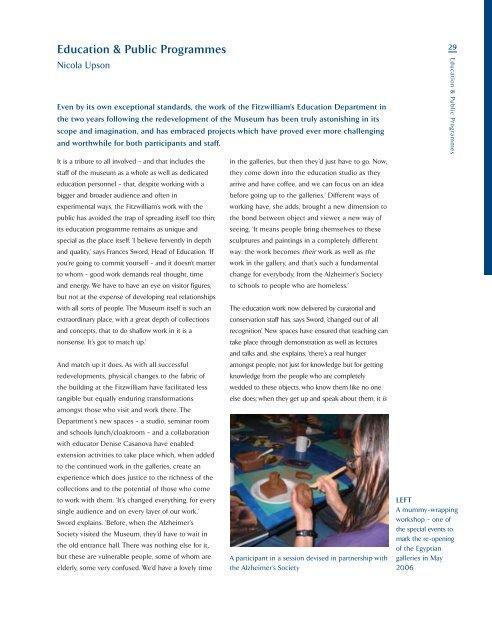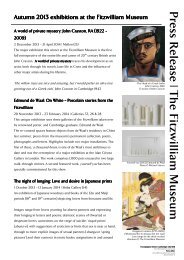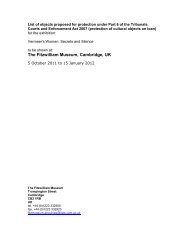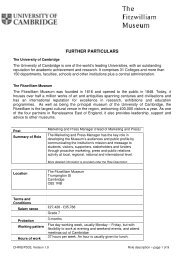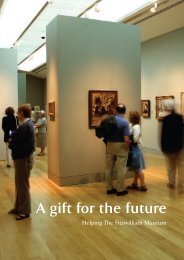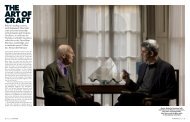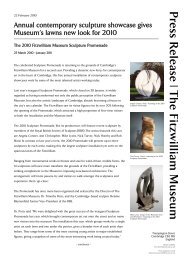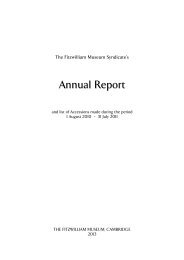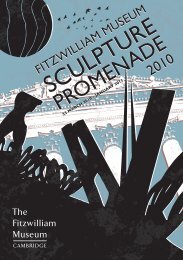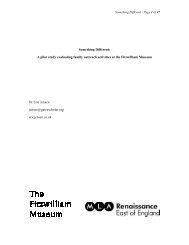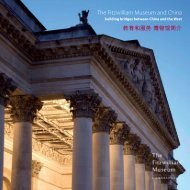The Fitzwilliam Museum - University of Cambridge
The Fitzwilliam Museum - University of Cambridge
The Fitzwilliam Museum - University of Cambridge
Create successful ePaper yourself
Turn your PDF publications into a flip-book with our unique Google optimized e-Paper software.
Education & Public Programmes<br />
Nicola Upson<br />
Even by its own exceptional standards, the work <strong>of</strong> the <strong>Fitzwilliam</strong>’s Education Department in<br />
the two years following the redevelopment <strong>of</strong> the <strong>Museum</strong> has been truly astonishing in its<br />
scope and imagination, and has embraced projects which have proved ever more challenging<br />
and worthwhile for both participants and staff.<br />
It is a tribute to all involved - and that includes the<br />
staff <strong>of</strong> the museum as a whole as well as dedicated<br />
education personnel - that, despite working with a<br />
bigger and broader audience and <strong>of</strong>ten in<br />
experimental ways, the <strong>Fitzwilliam</strong>’s work with the<br />
public has avoided the trap <strong>of</strong> spreading itself too thin;<br />
its education programme remains as unique and<br />
special as the place itself. ‘I believe fervently in depth<br />
and quality,’ says Frances Sword, Head <strong>of</strong> Education. ‘If<br />
you’re going to commit yourself - and it doesn’t matter<br />
to whom - good work demands real thought, time<br />
and energy. We have to have an eye on visitor figures,<br />
but not at the expense <strong>of</strong> developing real relationships<br />
with all sorts <strong>of</strong> people. <strong>The</strong> <strong>Museum</strong> itself is such an<br />
extraordinary place, with a great depth <strong>of</strong> collections<br />
and concepts, that to do shallow work in it is a<br />
nonsense. It’s got to match up.’<br />
And match up it does. As with all successful<br />
redevelopments, physical changes to the fabric <strong>of</strong><br />
the building at the <strong>Fitzwilliam</strong> have facilitated less<br />
tangible but equally enduring transformations<br />
amongst those who visit and work there. <strong>The</strong><br />
Department’s new spaces - a studio, seminar room<br />
and schools lunch/cloakroom - and a collaboration<br />
with educator Denise Casanova have enabled<br />
extension activities to take place which, when added<br />
to the continued work in the galleries, create an<br />
experience which does justice to the richness <strong>of</strong> the<br />
collections and to the potential <strong>of</strong> those who come<br />
to work with them. ‘It’s changed everything, for every<br />
single audience and on every layer <strong>of</strong> our work,’<br />
Sword explains. ‘Before, when the Alzheimer’s<br />
Society visited the <strong>Museum</strong>, they’d have to wait in<br />
the old entrance hall. <strong>The</strong>re was nothing else for it,<br />
but these are vulnerable people, some <strong>of</strong> whom are<br />
elderly, some very confused. We’d have a lovely time<br />
in the galleries, but then they’d just have to go. Now,<br />
they come down into the education studio as they<br />
arrive and have c<strong>of</strong>fee, and we can focus on an idea<br />
before going up to the galleries.’ Different ways <strong>of</strong><br />
working have, she adds, brought a new dimension to<br />
the bond between object and viewer, a new way <strong>of</strong><br />
seeing. ‘It means people bring themselves to these<br />
sculptures and paintings in a completely different<br />
way: the work becomes their work as well as the<br />
work in the gallery, and that’s such a fundamental<br />
change for everybody, from the Alzheimer’s Society<br />
to schools to people who are homeless.’<br />
<strong>The</strong> education work now delivered by curatorial and<br />
conservation staff has, says Sword, ‘changed out <strong>of</strong> all<br />
recognition’. New spaces have ensured that teaching can<br />
take place through demonstration as well as lectures<br />
and talks and, she explains, ‘there’s a real hunger<br />
amongst people, not just for knowledge but for getting<br />
knowledge from the people who are completely<br />
wedded to these objects, who know them like no one<br />
else does; when they get up and speak about them, it is<br />
A participant in a session devised in partnership with<br />
the Alzheimer’s Society<br />
29<br />
Education & Public Programmes<br />
LEFT<br />
A mummy-wrapping<br />
workshop - one <strong>of</strong><br />
the special events to<br />
mark the re-opening<br />
<strong>of</strong> the Egyptian<br />
galleries in May<br />
2006


